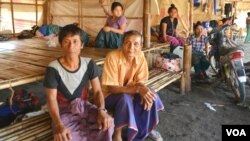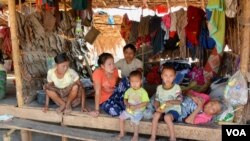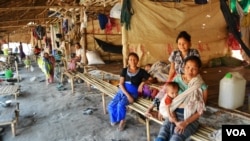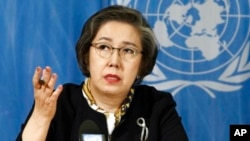Seated amid his family's simple possessions in a bamboo and thatch-roofed shelter, Saw Maung Care describes with anguish how they lost their home and livelihood as conflict flared in southeastern Myanmar in September.
"The soldiers came and destroyed some of our farms, our houses and firewood. We are angry, but we cannot do anything," he said, explaining that the army reportedly burned down many evacuated houses to prevent rebels from hiding there.
Saw Maung Care said he and some 5,500 ethnic Kayin had to quickly flee their villages near Kayin State's border with Thailand, leaving their farm animals and rice harvest behind. They have since lived off limited food handouts in Myaing Gyi Ngu camp, a parched field with rows of cramped, ramshackle huts with little water, hygiene or sanitation.
Management of the IDP camp - where a third of the population is under 13 years of age - said they faced a constant food shortage as state authorities had blocked international aid deliveries to the site in Hlaingbwe Township.
"Our amount of food is only enough for four days," said Naw Tin La, who managed the camp's food warehouse, adding that they only received irregular food donations from state authorities and Kayin community groups.
"We don't know why the high-level authorities stop foreign organizations - we want to accept donations from anyone," she said.
World Food Program (WFP) spokesperson Arsen Sahakyan said on Tuesday that state authorities had declined the agency's offer of food support, adding that WFP last made a limited food delivery of high-energy biscuits for children in November.
138,000 newly displaced
The government restrictions on international aid access for the Kayin IDPs are part of a nationwide trend of worsening conflict, displacement and humanitarian conditions, a recent report by the United Nations Office for the Coordination of Humanitarian Affairs (UNOCHA) warned.
It said international aid agencies now face restrictions or limited access in 21 crisis-hit townships in Myanmar. "Unfortunately, our ability to reach people who depend on humanitarian assistance in different parts of the country has been getting worse," said UNOCHA spokesperson Pierre Péron.
Conflict escalated after Aung San Suu Kyi's first peace conference in September. Her government could only stand by as the powerful army launched dry-season offensives against ethnic rebels, who launched counterattacks.
In Rakhine State, her government defended a brutal army crackdown in Rohingya Muslim communities after local insurgents attacked police stations on October 9.
Since then, some 138,000 civilians fled their homes in Rakhine, Shan, Kachin and Kayin states, and only 21,000 have returned, according to UNOCHA. Some 94,000 are Rohingya who fled alleged army abuses, which the military denies, and about 74,000 of them crossed into Bangladesh.
Last week saw a new wave of displacement as a reported 20,000 Kokang civilians, an ethnic Chinese minority, fled Shan State for China after Kokang rebels launched surprise attacks on Laukkai town on March 6.
The new displacement adds to the roughly 220,000 long-term IDPs who were displaced in the states since 2012. Another 100,000 Kayin refugees have lived in camps in Thailand since the 1990s.
Shrinking aid access
In most cases, the army has blocked aid access, ostensibly for security reasons. UNOCHA said international food deliveries to about 42,000 IDPs in rebel-held areas in Kachin and Shan states, which were already falling because of a UN funding shortfall, have been blocked for months.
In northern Rakhine, aid access to 20,000 IDPs and some 150,000 impoverished and undernourished Rohingya villagers was severely restricted from October until the start of this year, UNOCHA said.
Since then, the agency said, "the government permitted an incremental resumption of humanitarian activities, including distributions of food and other relief items." But many limitations remain, including a ban on visits by international staff.
Widespread abuses
At a UN Human Rights Council meeting on Monday, Special Rapporteur on Human Rights in Myanmar Yanghee Lee alleged widespread army abuses against the Rohingya, such as rape, murder and the destruction of villages. She also condemned abuses in other ethnic areas and the lack of aid access in crisis-hit states.
Lee warned that Myanmar "may be trying to expel the Rohingya population from the country altogether" and called for a Commission of Inquiry, the highest-level UN probe, into Rohingya abuses. However, leading EU states reportedly favor a softer approach.
Myanmar's Permanent Representative at the UN, Hau Do Suan, urged the Council to wait for his government's investigations into alleged army abuses - an inquiry that rights activists believe will yield little result.
Hau Do Suan said the authorities were duly facilitating the international aid response in Rakhine. He added that IDPs in Kachin rebel areas could cross the front line on foot to pick up food at army distribution points - a proposal that UN agencies have repeatedly rejected as completely unsafe.
'There are so many land mines'
Until September, Kayin State had not seen fighting for years and major rebel groups signed the Nationwide Ceasefire Agreement with the government in 2015. But violence erupted when a splinter rebel group claimed the army killed its leader.
The IDPs at Myaing Gyi Ngu camp fled the rugged Mae Ta Waw area in northern Kayin, long considered a "black zone" - or an area where the army has little to no control and can deem anyone a legitimate target.
Kayin IDP Naw Tin Swe said life in their villages had been isolated: there was no voting in black zones in the historic 2015 elections, she had never heard of the peace process, nor did she speak Burmese. Her family of five yearned to return to their village nonetheless, but feared it would long remain unsafe.
"We heard Aung San Suu Kyi was elected; we don't know exactly. If she can give us help we will welcome it," Naw Tin Swe said. "We just really want to go back to our farm and home, but we heard there are so many land mines."







